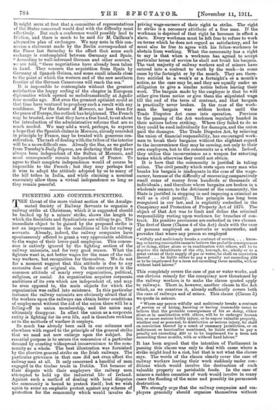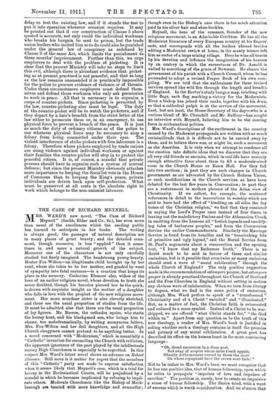PICKETING AND COUNTER-PICKETING.
threat of the more violent section of the Amalga- mated Society of Railway. Servants to organize a railway strike at Christmas, which it is suggested should be backed up by a miners' strike, shows the length to which the Socialists and Syndicalists are willing to go. The immediate object to be gained by the proposed strike is not an improvement in the conditions of life for railway servants. Already, indeed, the railway companies have spontaneously offered to grant a very appreciable addition to the wages of their lower-paid employees. This conces- sion is entirely ignored by the fighting section of the railway unionists, and for very good reason. What the fighters want is, not better wages for the mass of the rail- way workers, but recognition for themselves. We do not for a moment suggest that this attitude is due to any excessive dose of original sin. On the contrary it is the common attitude of nearly every organization, political, religious, or social. An organization acquires corporate ambitions of its own which are independent of, and may be even opposed to, the main objects for which the organization was called into existence. In this particular instance the railway unionists are obviously afraid that if the workers upon the railways can obtain better conditions of employment without the aid of the union there will be a falling-off in union membership, ' and the union may ultimately disappear. In effect the union as a corporate entity is fighting for its own life, and is therefore reckless as to the methods of warfare it employs. So much has already been said in our columns and elsewhere with regard to the principle of the general strike that we need not now enlarge upon the subject. Its essential purpose is to secure the concession of a particular demand by creating widespread inconvenience to the com- munity as a whole. The best illustration was furnished by the abortive general strike on the Irish railways. The particular grievance in that case did not even affect the railway men at all. It only concerned a handful of men engaged in the timber trade in Dublin. Yet because of their dispute with their employers the railway men attempted to hold up the industrial life of Ireland. Against such a method of dealing with local disputes the community is bound to protect itself ; but we wish again to enter an emphatic protest against any scheme of protection for the community which would involve de- ?riving wage-earners of their right to strike.. The right to strike is a. necessary attribute of a free man. If the workman is deprived of that right he becomes in effect a Blare. Every workman must be left free to refuse to work on terms which he does not regard as satisfactory, and he must also be free to agree with his fellow-workmen to abstain from working. What the community has a right to say is that when a workman has agreed to accept particular terms of service he shall not break his bargain. The vast majority of railway workers and of miners have entered into a contract to work by the week—in some cases by the fortnight or by the month. They are there- fore entitled to a. week's or a fortnight's or a month's notice, as the case may be, and they are equally under an obligation to give a similar notice before leaving their work. The bargain made by the employer is that he will either give them notice or give them the stipulated wage till the, end. of the term of contract, and that bargain is practically never broken. In the case of the work- man the bargain was seldom broken until the Trade Disputes Act came into operation. Previous to the passing of the Act workmen regularly handed in their notices before striking. Where they failed to do so they could be sued individually for damages, and the union paid the damages. The Trade Disputes Act, by relieving the union of financial responsibility, has encouraged work- men to break their bargains without the slightest regard to the inconvenience they may be causing, not only to their own employers, but to the community as a whole. Indeed, they utilize this inconvenience as a weapon for extorting terms which otherwise they could not obtain.
It is here that the community is justified in taking action. The civil penalty which rests upon every man who breaks his bargain is inadequate in the case of the wage- earner, because of the difficulty of recovering comparatively small sums of money from hundreds or thousands of individuals ; and therefore where bargains are broken in a wholesale manner, to the detriment of the community, the State is justified. in stepping in and imposing a criminal as well as a civil penalty. This principle has long been recognized in our law, and is explicitly embodied in the Conspiracy and Protection of Property Act of 1875. The object of that Act was to limit and define the criminal responsibility resting upon workmen for breaches of con- tract. Its positive provisions are embodied in two clauses. The first of these (Clause 4 of the Act) deals with the case of persons employed on gasworks or waterworks, and provides that where any person so employed
wilfully and maliciously breaks a contract of service, . . know- ing or having reasonable cause to believe the probable consequences of so doing, either alone or in combination with others, will be to deprive the inhabitants of the city, borough, &c., wholly or to a great extent of their supply of gas or water, he shall on conviction thereof . . . be liable either to pay a penalty not exceeding £20 or to be imprisoned for a term not exceeding three months, with or without hard labour."
This completely covers the case of gas or water works, and one obvious remedy for the conspiracy now threatened by the railway workers is to make the clause quoted apply to railways. There is, however, another clause in the Act which, as we construe it, already sufficiently covers both the case of railways and of mines. This clause (Clause 5) we quote in extenso.
"Where any person wilfully and maliciously breaks a contract of service or of hiring, knowing or having reasonable cause to believe that the probable consequences of his so doing, either alone or in combination with others, will be to endanger human life, or cause serious bodily injury, or to expose valuable property, whether real or personal, to destruction or serious injury, he shall on conviction thereof by a court of summary jurisdiction, or on indictment as hereinafter mentioned, be liable either to pay a penalty not exceeding .220 or to be imprisoned for a term not exceeeding three months, with or without hard labour."
It has been argued that the intention of Parliament in passing this clause was only to deal with cases where a strike might lead to a riot, but that is not what the clause says. The words of the clause clearly cover the case of railway workers leaving their work suddenly under con- ditions which would involve the destruction of such valuable property as perishable foods. In the case of miners a sudden cessation of work would involve in many cases the flooding of the mine and possibly its permanent destruction.
We strongly urge that the railway companies and em- ployers generally should organize themselves without delay to test the existing law, and if it stands the test to put it into operation wherever occasion requires. It may be pointed out that if our construction of Clause 5 above quoted is accurate, not only could the individual workman who breaks his bargain be sent to prison, but the trade union leaders who incited him so to do could also be punished under the general law of conspiracy as redefined by Clause 3 of the same Act, which limits the punishment to three months' imprisonment. Further than this, we urge employers to deal with the problem of picketing. It is clear that the present Ministry will take no steps to limit this evil, although there is abundant evidence that picket- ing as at present practised is not peaceful, and that as long as the law remains unamended it is practically impossible for the police to procure evidence of violence or of threats. Under these circumstances employers must defend them- selves and defend those workmen who only ask permission to work in peace. All that is necessary is to organize a corps of counter-pickets. Since picketing is permitted by the law, counter-picketing also must be legal. The duty of the counter-picket will be to watch the picketers, and if they depart by a hair's breadth from the strict letter of the law either to prosecute them or, in an emergency, to use physical force to prevent a breach of the peace. It is just as much the duty of ordinary citizens as of the police to use whatever physical force may be necessary to stop a felony from being committed under their eyes. The violent interference of strike pickets with free labourers is a felony. Therefore where pickets employed by trade unions are using violence against individual workmen or against their families the counter. picket will step in to protect the peaceful citizen. It is, of course, a scandal that private persons should have to organize such a system of mutual defence; but since the present Ministry obviously attaches more importance to keeping the Socialist vote in the House of Commons than to keeping the King's peace, private individuals are driven back upon self-protection. What must be preserved at all costs is the absolute right to work which belongs to the non-unionist labourer.



















































 Previous page
Previous page